- Home
- W. Somerset Maugham
The Razor's Edge Page 6
The Razor's Edge Read online
Page 6
'Uncle Elliott says he's often been surprised at your power of observation. He says nothing much escapes you, but that your great asset as a writer is your common sense.'
'I can think of a quality that would be more valuable,' I answered dryly. 'Talent, for instance.'
'You know, I have no one to talk this over with. Mamma can only see things from her own point of view. She wants my future to be assured.'
'That's natural, isn't it?'
'And Uncle Elliott only looks at it from the social side. My own friends, those of my generation, I mean, think Larry's a washout. It hurts terribly.'
'Of course.'
'It's not that they're not nice to him. One can't help being nice to Larry. But they look upon him as a joke. They josh him a lot and it exasperates them that he doesn't seem to care. He only laughs. You know how things are at present?'
'I only know what Elliott has told me.'
'May I tell you exactly what happened when we went down to Marvin?'
'Of course.'
I have reconstructed Isabel's account partly from my recollection of what she then said to me and partly with the help of my imagination. But it was a long talk that she and Larry had, and I have no doubt that they said a great deal more than I now propose to relate. I suspect that as people do on these occasions they not only said much that was irrelevant, but said the same things over and over again.
When Isabel awoke and saw that it was a fine day she gave Larry a ring and, telling him that her mother wanted her to go to Marvin to do something for her, asked him to drive her down. She took the precaution to add a thermos of martinis to the thermos of coffee her mother had told Eugene to put in the basket. Larry's roadster was a recent acquisition and he was proud of it. He was a fast driver and the speed at which he went exhilarated them both. When they arrived, Isabel, with Larry to write down the figures, measured the curtains that were to be replaced. Then they set out the luncheon on the stoop. It was sheltered from any wind there was and the sun of the Indian summer was good to bask in. The house, on a dirt road, had none of the elegance of the old frame houses of New England, and the best you could say of it was that it was roomy and comfortable, but from the stoop you had a pleasing view of a great red barn with a black roof, a clump of old trees, and beyond them, as far as the eye could reach, brown fields. It was a dull landscape, but the sunshine and the glowing tints of the waning year gave it that day an intimate loveliness. There was an exhilaration in the great space that was spread before you. Cold, bleak, and dreary as it must have been in winter, dry, sunbaked, and oppressive as it may have been in the dog days, just then it was strangely exciting, for the vastness of the view invited the soul to adventure.
They enjoyed their lunch like the healthy young things they were and they were happy to be together. Isabel poured out the coffee and Larry lit his pipe.
'Now go right ahead, darling,' he said, with an amused smile in his eyes.
Isabel was taken aback.
'Go right ahead about what?' she asked with as innocent a look as she could assume.
He chuckled.
'Do you take me for a perfect fool, honey? If your mother didn't know perfectly well the measurements of the living-room windows I'll eat my hat. That isn't why you asked me to drive you down here.'
Recovering her self-assurance, she gave him a brilliant smile.
'It might be that I thought it would be nice if we spent a day together by ourselves.'
'It might be, but I don't think, it is. My guess is that Uncle Elliott has told you that I've turned down Henry Maturin's offer.'
He spoke gaily and lightly and she found it convenient to continue in the same tone.
'Gray must be terribly disappointed. He thought it would be grand to have you in the office. You must get down to work some time, and the longer you leave it the harder it'll be.'
He puffed at his pipe and looked at her, tenderly smiling, so that she could not tell if he was serious or not.
'Do you know, I've got an idea that I want to do more with my life than sell bonds.'
'All right then. Go into a law office or study medicine.'
'No, I don't want to do that either.'
'What do you want to do then?'
'Loaf,' he replied calmly.
'Oh, Larry, don't be funny. This is desperately serious.'
Her voice quivered and her eyes filled with tears.
'Don't cry, darling. I don't want to make you miserable.'
He went and sat down beside her and put his arm round her. There was a tenderness in his voice that broke her and she could no longer hold back her tears. But she dried her eyes and forced a smile to her lips.
'It's all very fine to say you don't want to make me miserable. You are making me miserable. You see, I love you.'
'I love you too, Isabel.'
She sighed deeply. Then she disengaged herself from his arm and drew away from him.
'Let's be sensible. A man must work, Larry. It's a matter of self-respect. This is a young country, and it's a man's duty to take part in its activities. Henry Maturin was saying only the other day that we were beginning an era that would make the achievements of the past look like two bits. He said he could see no limit to our progress and he's convinced that by 1930 we shall be the richest and greatest country in the world. Don't you think that's terribly exciting?'
'Terribly.'
'There's never been such a chance for a young man. I should have thought you'd be proud to take part in the work that lies before us. It's such a wonderful adventure.'
He laughed lightly.
'I dare say you're right. The Armours and the Swifts will pack more and better meat, the McCormicks will make more and better harvesters, and Henry Ford will turn out more and better cars. And everyone'll get richer and richer.'
'And why not?'
'As you say, and why not? Money just doesn't happen to interest me.'
Isabel giggled.
'Darling, don't talk like a fool. One can't live without money.'
'I have a little. That's what gives me the chance to do what I want.'
'Loaf?'
'Yes,' he answered, smiling.
'You're making it so difficult for me, Larry,' she sighed.
'I'm sorry. I wouldn't if I could help it.'
'You can help it.'
He shook his head. He was silent for a while, lost in thought. When at last he spoke it was to say something that startled her.
'The dead look so terribly dead when they're dead.'
'What do you mean exactly?' she asked, troubled.
'Just that.' He gave her a rueful smile. 'You have a lot of time to think when you're up in the air by yourself. You get odd ideas.'
'What sort of ideas?'
'Vague,' he said, smiling. 'Incoherent. Confused.'
Isabel thought this over for a while.
'Don't you think if you took a job they might sort themselves out and you'd know where you were?'
'I've thought of that. I had a notion that I might go to work with a carpenter or in a garage.'
'Oh, Larry, people would think you were crazy.'
'Would that matter?'
'To me, yes.'
Once more silence fell upon them. It was she who broke it. She sighed.
'You're so different from what you were before you went out to France.'
'That's not strange. A lot happened to me then, you know.'
'Such as?'
'Oh, just the ordinary casual run of events. My greatest friend in the air corps was killed saving my life. I didn't find that easy to get over.'
'Tell me, Larry.'
He looked at her with deep distress in his eyes.
'I'd rather not talk about it. After all, it was only a trivial incident.'
Emotional by nature, Isabel's eyes again filled with tears.
'Are you unhappy, darling?'
'No,' he answered, smiling. 'The only thing that makes me unhappy is that I'm making you unhapp
y.' He took her hand and there was something so friendly in the feel of his strong firm hand against hers, something so intimately affectionate, that she had to bite her lips to prevent herself from crying. 'I don't think I shall ever find peace till I make up my mind about things,' he said gravely. He hesitated. 'It's very difficult to put into words. The moment you try to you feel embarrassed. You say to yourself: "Who am I that I should bother my head about this, that, and the other? Perhaps it's only because I'm a conceited prig. Wouldn't it be better to follow the beaten track and let what's coming to you come?" And then you think of a fellow who an hour before was full of life and fun, and he's lying dead; it's all so cruel and so meaningless. It's hard not to ask yourself what life is all about and whether there's any sense to it or whether it's all a tragic blunder of blind fate.'
It was impossible not to be moved when Larry, with that wonderfully melodious voice of his, spoke, haltingly as though he forced himself to say what he would sooner have left unsaid and yet with such an anguished sincerity; and for a while Isabel did not trust herself to speak.
'Would it help you if I went away for a bit?'
She put the question with a sinking heart. He took a long time to answer.
'I think so. You try to be indifferent to public opinion, but it's not easy. When it's antagonistic it arouses antagonism in you and that disturbs you.'
'Why don't you go then?'
'Well, on account of you.'
'Let's be frank with one another, darling. There's no place for me in your life just now.'
'Does that mean you don't want to be engaged to me any more?'
She forced a smile to her trembling lips.
'No, foolish, it means I'm prepared to wait.'
'It may be a year. It may be two.'
'That's all right. It may be less. Where'd you want to go?'
He looked at her intently as though he were trying to see into her innermost heart. She smiled lightly to hide her deep distress.
'Well, I thought I'd start by going to Paris. I know no one there. There'd be no one to interfere with me. I went to Paris several times on leave. I don't know why, but I've got it into my head that there everything that's muddled in my mind would grow clear. It's a funny picture, it gives you the feeling that there you can think out your thoughts to the end without let or hindrance. I think there I may be able to see my way before me.'
'And what's to happen if you don't?'
He chuckled.
'Then I shall fall back on my good American horse sense, give it up as a bad job and come back to Chicago and take any work I can get.'
The scene had affected Isabel too much for her to be able to tell it to me without getting somewhat emotional, and when she finished she looked at me pitifully.
'Do you think I did right?'
'I think you did the only thing you could do, but what's more I think you've been wonderfully kind, generous, and understanding.'
'I love him and I want him to be happy. And you know, in a way I'm not sorry he should go. I want him to be out of this hostile atmosphere, and that not only for his sake, but for mine too. I can't blame people when they say he'll never amount to anything; I hate them for it, and yet all the time deep down in me I have an awful fear that they're right. But don't say I'm understanding. I don't begin to understand what he's after.'
'Perhaps you understand with your heart rather than with your reason.' I smiled. 'Why don't you marry him right away and go off to Paris with him?'
The shadow of a smile came into her eyes.
'There's nothing I'd like to do more. But I couldn't. And you know, though I hate to acknowledge it, I do really think he's better off without me. If Dr Nelson is right and he's suffering from delayed shock surely new surroundings and new interests will cure him, and when he's got his balance again he'll come back to Chicago and go into business like everybody else. I wouldn't want to marry an idler.'
Isabel had been brought up in a certain way and she accepted the principles that had been instilled into her. She did not think of money, because she had never known what it was not to have all she needed, but she was instinctively aware of its importance. It meant power, influence, and social consequence. It was the natural and obvious thing that a man should earn it. That was his plain life's work.
'It doesn't surprise me that you don't understand Larry,' I said, 'because I'm pretty sure he doesn't understand himself. If he's reticent about his aims it may be that it's because they're obscure to him. Mind you, I hardly know him and this is only guesswork: isn't it possible that he's looking for something, but what it is he doesn't know, and perhaps he isn't even sure it's there? Perhaps whatever it is that happened to him during the war has left him with a restlessness that won't let him be. Don't you think he may be pursuing an ideal that is hidden in a cloud of unknowing – like an astronomer looking for a star that only a mathematical calculation tells him exists?'
'I feel that something's troubling him.'
'His soul? It may be that he's a little frightened of himself. It may be that he has no confidence in the authenticity of the vision that he dimly perceives in his mind's eye.'
'He gives me such an odd impression sometimes; he gives me the impression of a sleep-walker who's suddenly wakened in a strange place and can't think where he is. He was so normal before the war. One of the nice things about him was his enormous zest for life. He was so scatter-brained and gay, it was wonderful to be with him; he was so sweet and ridiculous. What can have happened to change him so much?'
'I wouldn't know. Sometimes a very small thing will have an effect on you out of all proportion to the event. It depends on the circumstances and your mood at the time. I remember going to mass on All Saints' Day, which the French called the Day of the Dead, in a village church that the Germans had knocked about a bit on their first advance into France. It was filled with soldiers and with women in black. In the graveyard were rows of little wooden crosses and as the sad, solemn service went on, and women wept and men too, I had a feeling that perhaps those men who lay under the little crosses were better off than we who lived. I told a friend what I felt and he asked me what I meant. I couldn't explain and I saw that he thought me a perfect damned fool. And I remember after a battle seeing a pile of dead French soldiers heaped upon one another. They looked like the marionettes in a bankrupt puppet show that had been cast pell-mell into a dusty corner because they were of no use any more. I thought then just what Larry said to you: the dead look so awfully dead.'
I do not want the reader to think I am making a mystery of whatever it was that happened to Larry during the war that so profoundly affected him, a mystery that I shall disclose at a convenient moment. I don't think he ever told anybody. He did, however, many years later tell a woman, Suzanne Rouvier, whom Larry and I both knew, about the young airman who had met his death saving his life. She repeated it to me and so I can only relate it at second hand. I have translated it from her French. Larry had apparently struck up a great friendship with another boy in his squadron. Suzanne knew him only by the ironical nickname by which Larry spoke of him.
'He was a little chap with red hair, an lrishman. We used to call him Patsy,' Larry said, 'and he had more vitality than anyone I've ever known. Gosh, he was a live wire. He had a funny face and a funny grin, so that it made you laugh just to look at him. He was a harum-scarum devil and he'd do the craziest things; he was always getting hell from the higher-ups. He was absolutely without fear and when he'd escaped death by a hair's breadth he'd grin all over his face as if it was the best joke in the world. But he was a natural-born flyer and up in the air he was cool and wary. He taught me a lot. He was a bit older than me and he took me under his wing; it was rather comic really, because I was a good six inches taller than he was and if it had come to a scrap I could have knocked him out cold. Once in Paris when he was drunk and I was afraid he was going to get into trouble I did.
'I felt a bit out of it when I joined the squadron and I was afraid I wouldn't
make good, but he just joshed me into having confidence in myself. He was funny about the war, he had no feeling of hatred for the Jerries; he loved a scrap and to fight them tickled him to death. He simply couldn't look upon bringing down one of their planes as anything but a practical joke. He was impudent and wild and irresponsible, but there was something so genuine about him that you couldn't help liking him. He'd give you his last penny as freely as he'd take yours. And if you were lonely or homesick or scared, and I was sometimes, he'd see it and with his ugly little face puckered up with laughter he'd say just the right thing to make you feel all right again.'
Larry puffed at his pipe and Suzanne waited for him to go on.
'We used to wangle it so that we could get our leave together, and when we were in Paris he went wild. We had a grand time. We were due for a spot of leave early in March, in 'eighteen that was, and we made our plans beforehand. There wasn't a thing we weren't going to do. The day before we were to go we were sent up to fly over the enemy lines and bring back reports of what we saw. Suddenly we came bang up against some German planes, and before we knew where we were we were in the middle of a dogfight. One of them came after me, but I got in first. I took a look to see if he was going to crash and then out of the corner of my eye I saw another plane on my tail. I dived to get away from him, but he was on to me like a flash and I thought I was done for; then I saw Patsy come down on him like a streak of lightning and give him all he'd got. They'd had enough and sheered off and we made for home. My machine had got pretty well knocked about and I only just made it. Patsy got in before me. When I got out of my plane they'd just got him out of his. He was lying on the ground and they were waiting for the ambulance to come up. When he saw me he grinned.
'"I got that blighter who was on your tail," he said.
'"What's the matter, Patsy?" I asked.
'"Oh, it's nothing. He winged me."
'He was looking deathly white. Suddenly a strange look came over his face. It had just come to him that he was dying, and the possibility of death had never so much as crossed his mind. Before they could stop him he sat up and gave a laugh.
'"Well I'm jiggered," he said.

 The Skeptical Romancer: Selected Travel Writing
The Skeptical Romancer: Selected Travel Writing The Summing Up
The Summing Up Up at the Villa
Up at the Villa The Razor's Edge
The Razor's Edge The Complete Short Stories of W. Somerset Maugham: East and West (Vol. 1 of 2))
The Complete Short Stories of W. Somerset Maugham: East and West (Vol. 1 of 2))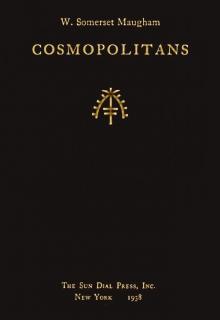 Cosmopolitans
Cosmopolitans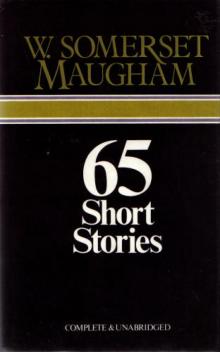 65 Short Stories
65 Short Stories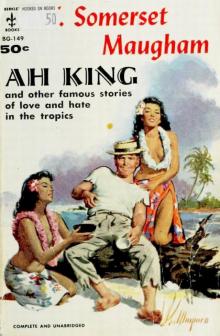 Ah King (Works of W. Somerset Maugham)
Ah King (Works of W. Somerset Maugham) Collected Short Stories: Volume 1
Collected Short Stories: Volume 1 Collected Short Stories Volume 2
Collected Short Stories Volume 2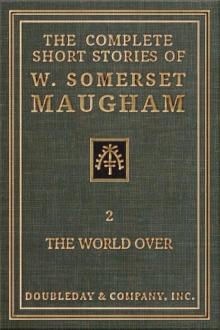 The Complete Short Stories of W. Somerset Maugham - II - The World Over
The Complete Short Stories of W. Somerset Maugham - II - The World Over Collected Short Stories Volume 4
Collected Short Stories Volume 4 Theatre
Theatre Short Stories
Short Stories Then and Now
Then and Now The Favorite Short Stories of W. Somerset Maugham
The Favorite Short Stories of W. Somerset Maugham Of Human Bondage
Of Human Bondage The Magician
The Magician The Great Exotic Novels and Short Stories of Somerset Maugham
The Great Exotic Novels and Short Stories of Somerset Maugham A Writer's Notebook
A Writer's Notebook Christmas Holiday
Christmas Holiday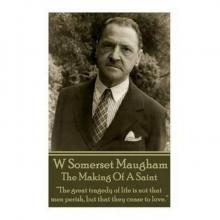 The Making of a Saint
The Making of a Saint Merry Go Round
Merry Go Round The Narrow Corner
The Narrow Corner Collected Short Stories Volume 3
Collected Short Stories Volume 3 Ten Novels and Their Authors
Ten Novels and Their Authors Ashenden
Ashenden The Moon and Sixpence
The Moon and Sixpence Cakes and Ale
Cakes and Ale Liza of Lambeth
Liza of Lambeth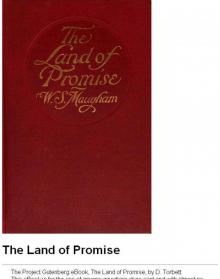 The Land of Promise: A Comedy in Four Acts (1922)
The Land of Promise: A Comedy in Four Acts (1922) A Writer's Notebook (Vintage International)
A Writer's Notebook (Vintage International) Orientations
Orientations Selected Masterpieces
Selected Masterpieces Mrs Craddock
Mrs Craddock The Skeptical Romancer
The Skeptical Romancer On a Chinese Screen
On a Chinese Screen (1941) Up at the Villa
(1941) Up at the Villa The Great Novels and Short Stories of Somerset Maugham
The Great Novels and Short Stories of Somerset Maugham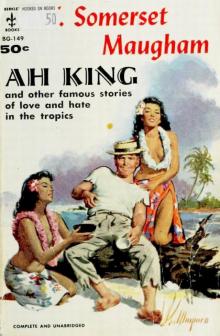 Ah King
Ah King The Explorer
The Explorer The Skeptical Romancer: Selected Travel Writing (Vintage Departures)
The Skeptical Romancer: Selected Travel Writing (Vintage Departures) The Complete Short Stories of W. Somerset Maugham - I - East and West
The Complete Short Stories of W. Somerset Maugham - I - East and West